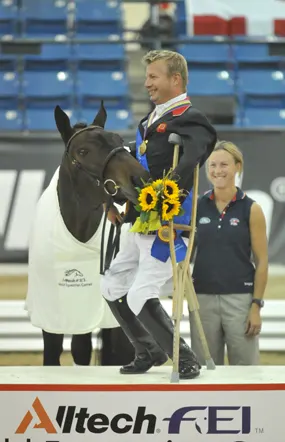When the dust finally settled in the para-dressage arena at the Kentucky Horse Park today, more than just medals were awarded. A new found appreciation for discipline was gained by the many spectators, judges, team members, organizers and many fans who played witness to the spectacular sport that took place over the last week.
“I feel very strongly that the para-dressage discipline has added an incredible thing to our family,” said HRH Princess Haya, president of the Federation Equestre Internationale. “Because the horse is an equalizer, you see no difference in the beauty and harmony of the product. We are the only International Federation that regulates both Para and International sport and for that achievement we are very proud.”
Great Britain’s Lee Pearson, who has now won 15 para-dressage gold medals with his trio of wins at this years’ WEG, put in a lovely Ib freestyle test today aboard his own Gentleman, a 9-year-old gelding, scoring 82.50 percent to keep up his impressive winning streak.
“The trot work is a lot easier than the walk work for me, so I show off in the trot,” said Pearson, 36. “I incorporate lateral work and extensions. After I choreograph my ride, I send the video to a music man who helps me with my freestyles, and tell him which country I’m going to. He puts music to it that’s appropriate to the country, so for here, it was very ‘yee-haw’ kind of music. It was a bit quick for my horse, but it made for a very energetic test.”
Pearson was born with arthrogryposis multiplex congentia, which means the muscles in his arms and legs grew as scar tissue in the womb. He began riding the family donkey at the age of six, and became a professional rider 12 years ago.
“Although you’ll hear a lot of inspiring stories, this is top sport. No different than any of athletes in any other discipline,” said Pearson. “I think it’s been amazing to be mixed in with the other disciplines and made to feel welcome.”
Listen to an interview with Lee Pearson.
ADVERTISEMENT
Grade Ia
Emma Sheardown and Purdy’s Dream scored 78.55 percent to win gold in the Ia freestyle. Sheardown, 25, has cerebral palsy, and has been a part of Great Britain’s World Class Development Squad since 2004.
“We had a good walk; I managed to keep him relaxed and with me. Sometimes, he can drop behind the bit, but I had a nice contact with him. We had a nice, flowing test,” said Sheardown, who also won a bronze medal in the Ia individual test.
Grade II
Dr. Angelika Trabert was born without legs, but it does not stop her from winning gold medals or working as an anaesthetist. She won the freestyle gold aboard Ariva-Avanti, a 7-year-old Hesse mare, on a score of 75.90 percent.
Grade III
Hannelore Brenner started her riding career in the eventing world, but a riding accident in 1986 left her paralyzed. With the aid of Women of the World, a striking chestnut mare, she clinced freestyle gold with 79.20 percent.
ADVERTISEMENT
“I’m riding more successful in dressage then before my accident,” she said with a laugh. “We are like an old couple. She knows what I think and I hope I know what she thinks. She was so free and very happy. It’s amazing to compete here, the para sport has really taken a step forward.”
Grade IV
Great Britain’s Sophie Wells added another gold to her individual title, scoring 78.50 percent on Pinocchio.
“My freestyle didn’t quite go to plan, my horse very energetic in the warm-up, so I decided not to take my whips in the ring,” said Wells, who has amniotic band syndrome. “The test started really well, with good extensions, and he was good in the trot. But when I picked him up from the walk to canter, he came a little bit against me. I had a mistake in my first simple change, so all the way after that, I was trying to think where I could put in another simple change to pick up some marks. I decided to do a simple change each way at the end of the test, just to bump the marks back up again. Thankfully it was just enough to win the gold!”
Listen to an interview with Sophie Wells.
See the Oct. 22 issue of The Chronicle of the Horse magazine for all the news about WEG vaulting. And check out the Nov. 5 issue, our WEG Analysis Issue, for in-depth stories about the WEG performances and what they say about the U.S. programs.















